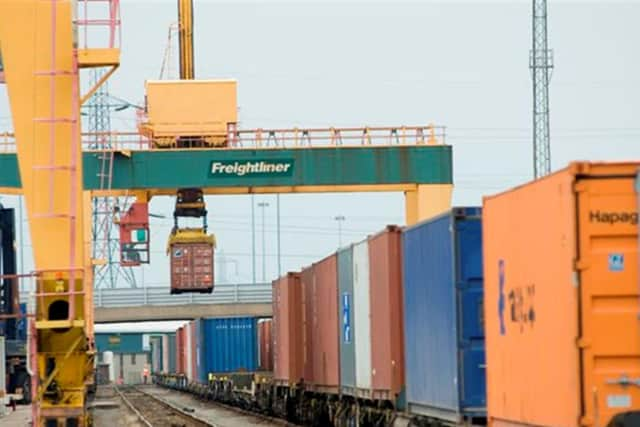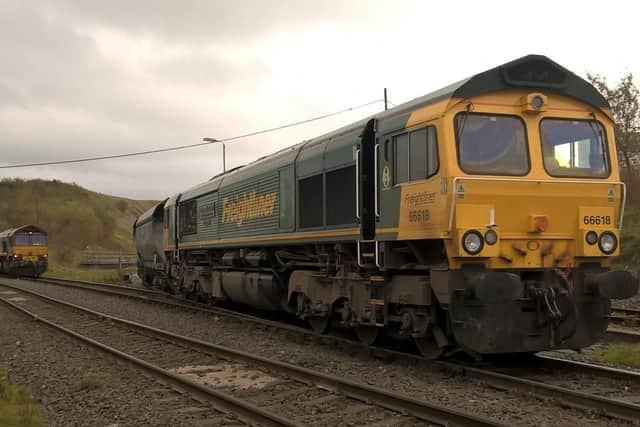North west's railways - and their workers - keep essential supplies moving across the country
and live on Freeview channel 276
Meanwhile, a Lancashire MP has praised the key workers who keep the network moving.
Every 24 hours, 131,000 tonnes of critical supplies – including food, fuel and medicine – are being moved by rail between Cheshire, Derbyshire, the Liverpool City Region, Greater Manchester, Lancashire, Cumbria and Scotland.
Advertisement
Hide AdAdvertisement
Hide AdThat’s 786,000 tonnes every week – most of it transported along the West Coast main line (WCML), the busiest mixed-use (passenger and freight) railway in Europe, and its key spurs, such as the mid-Cheshire lines, Hope Valley line and Clitheroe line.


Despite passenger services reducing in recent weeks, customer demand for critical supplies has remained consistent, and the freight industry and Network Rail are keeping key supply lines open and trains moving.
As the coronavirus pandemic goes on, Network Rail’s priority is to keep vital supply routes, notably the West Coast main line and its key arteries, open. Critical to this are frontline specialists, such as signallers, without whom the railway cannot operate.
Nigel Evans, deputy speaker for the House Commons and MP for Clitheroe, said: “Rail freight is a sector which has increasing importance both locally in the North West, and nationally, as the country moves to reduce carbon emissions and reduce the traffic on our roads. But it also performs a vital function now. The Covid-19 crisis has illuminated to everyone the importance of capacity and resilience in supply chains, and rail freight is an integral part of that.
Advertisement
Hide AdAdvertisement
Hide Ad“The people who work in the rail freight sector often go unnoticed, working during all hours of the day, and I am pleased that we can highlight their vital work at this challenging time for the country.”


Phil James, route managing director for the North West Route, added: “Rail freight has never mattered more than now for the people of Britain. Our job is to continue moving critical supplies where they’re needed – keeping wholesalers and supermarket shelves stocked, hospital medicine cupboards full, power stations fuelled and construction and manufacturing ticking over.
“Our frontline ‘key workers’, including signallers, control room staff and maintenance engineers are the hidden heroes in this national team effort. They are helping NHS medics to save lives and keeping shop shelves stocked, and I’m very proud of them.”
Freight plays a crucial role in keeping the country’s lights on. Trains carry biomass from Liverpool docks to the Drax power station in Yorkshire, as well as petroleum from Scotland to Dalston in Cumbria.
Advertisement
Hide AdAdvertisement
Hide AdRoyal Mail trains continue to take parcels and post between Wembley and Shieldmuir, Glasgow via Warrington. As Scotland does not have any deep-sea ports, it relies on freight services through NW&C to keep its shops stocked.
Every 24 hours, 18,500 tonnes of bananas, pasta, loo roll and other essentials pass over the England- Scottish border at Gretna in freight trains. Next day, those goods can be found on sale in supermarkets and high street shops.
Without freight trains, manufacturing and construction could not function. Timber to make paper, sand for glass, cement and stone for construction – commodities heavily relied upon by UK business – are fabricated right here in the North West.
Freight companies are looking at how they can reconfigure the trains in order to get more containers per train to meet a forecast rise in demand over coming weeks and months.
Advertisement
Hide AdAdvertisement
Hide AdMaggie Simpson, director general of Rail Freight Group, said: “The rail freight industry is working flat out to make sure essential supplies are available on supermarket shelves, that the lights stay on and that the warehouses have all the goods we need for online shopping.
“It is a real testament to all our staff, and those at Network Rail and across the railway for keeping up with changing demand and helping the whole of the UK in these difficult times.”
To prioritise freight and key worker journeys, a reduced timetable is currently running on the railway network.
Government guidelines are advising the public to only travel if absolutely essential.
Advertisement
Hide AdAdvertisement
Hide AdPeople making essential journeys should visit www.nationalrail.co.uk to check the revised train times.
What moves where?
• Scotland’s supermarkets rely on goods by rail to stay stocked
• Biomass fuel is taken by rail from Liverpool Docks to Yorkshire’s Drax power station
• Royal Mail post goes by rail between Warrington and Glasgow
• Cement is transported to Scotland from Clitheroe
• Sand for glass is carried from West Cumbria to Wigan
• Timber for paper making is passed from Carlisle to Shropshire
• Aggregate for construction is taken from the Peak District quarries
Comment Guidelines
National World encourages reader discussion on our stories. User feedback, insights and back-and-forth exchanges add a rich layer of context to reporting. Please review our Community Guidelines before commenting.